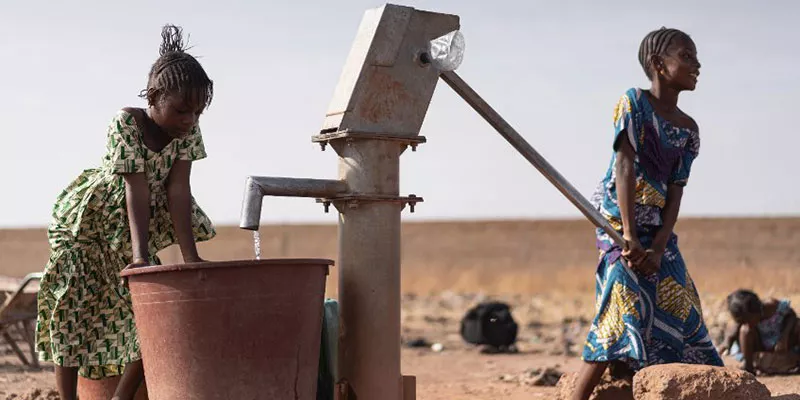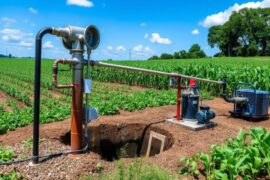Key Takeaways
- Boreholes provide reliable local water sources, reducing dependency on distant supplies, but can lead to groundwater depletion if over-extracted.
- Environmental concerns arise from habitat disruption and alteration of natural water cycles due to drilling activities.
- Sustainable practices, like rainwater harvesting, can mitigate negative impacts and promote ecological balance alongside borehole use.
- Community engagement in water management fosters responsibility and conservation, enhancing the sustainability of boreholes.
- Responsible water management strategies are essential to address both human needs and environmental health in borehole implementation.
The Benefits of Boreholes: A Sustainable Water Solution
As communities face increasing water scarcity, boreholes emerge as a sustainable solution that directly addresses this pressing issue. By tapping into underground aquifers, boreholes can provide a reliable and local water source, reducing dependency on distant water supplies. This approach aligns with sustainable practices, as it minimizes transportation costs and the environmental impact associated with water distribution. Moreover, borehole projects often promote community engagement. When local residents participate in the planning and implementation, they develop a vested interest in maintaining the system. This collaboration fosters a sense of ownership, ensuring that the water supply is managed effectively and sustainably. Evidence suggests that communities involved in their water management tend to adopt conservation practices, further enhancing the sustainability of boreholes.Are Borehole Water Safe to Drink in Ghanaian Homes?
Can borehole water be a safe drinking option for Ghanaian homes? Discover the essential factors that determine its safety and your health.
Environmental Concerns: The Hidden Costs of Borehole Drilling
While boreholes can provide crucial water resources, they also come with significant environmental concerns that often go unrecognized. One major issue is water depletion. When boreholes are over-extracted, the groundwater levels can drop, leading to diminished water availability for both human use and local ecosystems. This exploitation can create a ripple effect, endangering flora and fauna that rely on stable water sources.
Additionally, borehole drilling can cause ecosystem disruption. The process often requires heavy machinery, which can disturb soil and vegetation, leading to habitat loss for various species. Moreover, the extraction of water can alter the natural hydrological cycle, affecting nearby rivers and wetlands.
These hidden costs of borehole drilling highlight the need for careful consideration of environmental impacts. It is crucial to assess how your water needs align with the health of local ecosystems to promote sustainable practices moving forward.
Balancing Needs and Risks: Finding Responsible Water Management Solutions
Recognizing the environmental impacts of borehole drilling paves the way for exploring responsible water management solutions. To balance the increasing demand for water with the need to protect ecosystems, you must embrace sustainable practices that prioritize both human and environmental health. Implementing effective resource management strategies, such as rainwater harvesting and aquifer recharge, can alleviate some pressures on boreholes. Additionally, community involvement in water governance guarantees that local needs are met while promoting conservation. Regular monitoring of water quality and quantity helps identify potential risks associated with borehole use, allowing for timely interventions. By adopting these strategies, you not only mitigate environmental harm but also enhance the resilience of water supplies. Ultimately, responsible water management involves a thorough approach that integrates sustainable practices with local knowledge, fostering a balance between resource utilization and ecological preservation.805 Restaurant – Authentic African Cuisine With a Modern Twist
Celebrate the vibrant flavors of Africa at 805 Restaurant, where tradition meets innovation—discover the culinary journey that awaits you inside.
Frequently Asked Questions
How Does Borehole Drilling Impact Local Wildlife Habitats?
Borehole drilling often leads to wildlife displacement and habitat fragmentation. You’ll notice local species struggle as their environments change, impacting their survival and reproduction rates, ultimately disrupting the ecological balance in the area.Are There Regulations Governing Borehole Drilling Practices?
Yes, there are borehole regulations in place. You’ll need drilling permits that guarantee compliance with environmental standards, protect local ecosystems, and manage resource extraction. Understanding these regulations is essential for responsible borehole drilling practices.What Is the Lifespan of a Typical Borehole?
A typical borehole’s lifespan ranges from 10 to 50 years, depending on borehole maintenance and advancements in borehole technology. Regular upkeep safeguards peak performance, mitigating risks of contamination and decreased water quality over time.Can Boreholes Lead to Groundwater Contamination?
Boreholes can lead to groundwater contamination if not properly managed. You must consider potential contamination sources, like surface runoff or improper sealing, to guarantee effective groundwater protection and maintain the integrity of your water supply.How Do Boreholes Affect Nearby Surface Water Bodies?
Boreholes can considerably affect surface water interaction, especially if they penetrate deep aquifers. You need to take into account borehole depth, as it influences how groundwater withdrawal alters nearby surface water levels and quality over time.Conclusion
In summary, while boreholes offer a sustainable water solution, it’s important to recognize their potential environmental impacts. By understanding both the benefits and the hidden costs, you can make informed decisions about water management. Balancing your community’s water needs with responsible practices is fundamental to minimize risks. Ultimately, fostering a dialogue around borehole usage can lead to innovative solutions that safeguard the environment while ensuring access to essential water resources.Discover more from Ghana Scoop
Subscribe to get the latest posts sent to your email.





